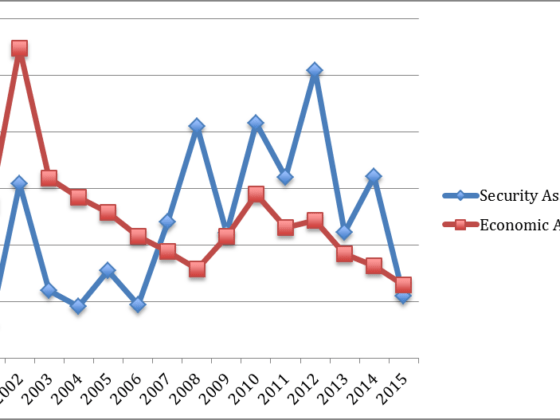How can scholars make significant contributions to policy making? Reflecting on a grant from Carnegie Corporation of New York to strengthen regional studies training at U.S. universities, Indiana University’s Russian Studies Workshop organized a roundtable at last week’s ASEEES conference in Chicago that featured four outstanding scholar/practitioners. Panel chairperson, Michael Kimmage, professor of history at Catholic University and a former member of the U.S. Secretary of State’s Office of Policy Planning for Russia and Eurasia, prompted participants to identify how scholarly and think tank expertise has proven valuable in policy formation, and to highlight critical gaps in regional studies knowledge.
Panelists approached the questions by identifying Russian regional studies as a community of specialists that spans universities and colleges, government, think tanks, NGOs, the private sector, and foundations. Each speaker stressed the crucial role for networks, skills, and practices that can transcend the boundaries that divide the community and enable broad discussion aimed at more effective, fact-based policy decisions. Panelists unanimously agreed that academics’ greatest contribution to policy relevance lies in their core missions as university and college faculty: deep, original research and training of the next generation of regional specialists.
Dr. Celeste Wallander, president and CEO of the U.S. Russia Foundation and former special assistant to the president and senior director for Russia/Eurasia on the National Security Council, argued that university-based scholars make a profound contribution by preparing the next generation of informed and engaged students at all levels. At the same time, Dr. Wallander emphasized the need for universities to do a better job training students. The urgent demands of global events means that strong prior preparation is essential for effective decision-making as there is little time to stop and consider new research. She stressed that policymakers must have the skills to assess causality with fact-based analysis, and to communicate clearly in sharply argued, brief texts. While each panelist underlined this call for effective writing, Dr. Kimmage added that precision is also essential for oral communication, noting that fifteen-minutes constitutes a long presentation in the government context.
Dr. Jeffrey Mankoff, deputy director and senior fellow at the Russia and Eurasia Program at the Center for Strategic and International Studies (CSIS) and former adviser on U.S.-Russian relations at the U.S. Department of State, reiterated the critical role of university-based training and research in accumulating expertise. He argued that academics can do more to bridge the gap between the scholarly and policy communities. In general, he said, academic work often lacks influence because it is not accessible. He echoed the panel’s call for clearly articulated ideas, stressing that academic work permeates the policy community when it is closely tied to real world puzzles and challenges.
Dr. Mankoff argued that think tanks play an important role in forging networks of D.C-based scholars that inform the international policy community and shift decision-making frames. Echoing Dr. Wallander’s emphasis on the importance of university-based research, he argued that think tanks are distinct from universities in two ways. First, the boundaries between think tanks and government are porous. Ideas generated in think tanks filter into public discussions through personal networks, reports, media appearances, and participation in seminars and conferences. Yet, similar to the dynamics in government, research in think tanks is driven by the urgency of responding to real world problems and demonstrating clear influence in the policy process. The scholarly community works on a different logic, creating lasting knowledge that becomes relevant as real-world challenges shift. With effective communication and deep networks, these are complementary paths to improve policy decisions, inform foreign audiences, and increase popular understanding of Russia beyond the headlines.
Dr. John Slocum, visiting scholar at the Barcelona Center for International Affairs, added the perspective of a long-time program director at the John D. and Catherine T. MacArthur Foundation. For nearly a century, foundations worked to develop regional studies expertise. Initially, they funded policy-relevant research without creating direct linkages across the policy-university divide. This model shifted with the demise of the Soviet Union. Under David Hamburg, former president of the Carnegie Corporation of New York, foundations increasingly brought scholarly attention to critical global problems with the goal of identifying informed policy solutions. They also became more pro-active in constructing platforms for information exchange, interaction, and networks linking specialists in government and academia.
Dr. Slocum emphasized that foundations’ conceptions of policy influence is not limited to U.S. audiences. Foundations endeavor to increase global understanding of U.S. foreign policy goals and policy processes. Foundations also build global policy expertise by providing technical assistance, awarding individual grants, establishing graduate training programs and think tanks, supporting scholarly networks, and promoting outlets, such as journals, to showcase debates.
Dr. Kimmage brought the discussion back to substantive concerns. He identified three critical areas of research that are under-represented in the scholarly community: Russian military affairs and public support for the military, the role of the Russian Orthodox Church in national policy and society, and the complexities of Russian regional politics. Dr. Mankoff added that lack of understanding of U.S. foreign policy beyond the Beltway has emerged as a national security problem that needs to be addressed by a partnership across the regional studies community to educate U.S. citizens how to navigate the complexity of the globalized, international community.
Discussion among these scholars with experience across different regional studies community stressed the importance of continuing to increase the expert influence to produce more effective, fact-based policy decisions. The discussion highlighted steps to meet this challenge:
- Understand the needs and challenges that face different groups of specialists within the broader regional studies community.
- Continue to support university-based research and the tools to communicate findings to non-academic specialists.
- Strengthen student training in essential skills, especially causal inference and clear and focused communication.
- Sustain networks that link regional studies specialists at universities with those in government, NGOs, think tanks, foundations, and the private sector.
- Construct a broader definition of relevance that draws on comprehensive research and looks beyond Washington, D.C., to inform non-specialists, and especially ordinary citizens, in the United States, Europe, and the broader global audience.











